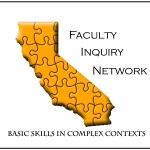About FIN
The Faculty Inquiry Network: Basic Skills in Complex Contexts
 The Faculty Inquiry Network is based at Chabot College in Hayward, California. Chabot was one of the 11 California community colleges to participate in the SPECC project.
The Faculty Inquiry Network is based at Chabot College in Hayward, California. Chabot was one of the 11 California community colleges to participate in the SPECC project.
The Faculty Inquiry Network seeks community college faculty to create a “community of practice” united around a set of shared values for strengthening basic skills education. We’re looking for faculty who hold a belief in students’ capability and a willingness to change their practice to more effectively engage this capability; faculty committed to investing intentional time and effort to understand what students need to find their footing and thrive in the college environment; faculty who understand that what we call “basic skills” involves complex cognitive routines and affective dimensions that only seem simple after they have become second-nature to the student; faculty who believe that effective basic skills education must go beyond delivering discrete, bite-sized skills and engage students in meaningful intellectual work; and faculty with a commitment to working in an open, transparent, and collegial manner.
Funded by a grant from The William and Flora Hewlett Foundation, the Faculty Inquiry Network will be compromised of teams from 15 colleges across California. At each college, a Faculty Inquiry Network will investigate a complex problem about basic skills education–a thorny, difficult question we need to grapple with to better understand how students learn, what’s getting in their way, and how to reach them.
The Network will be organized around regional hubs in the greater Los Angeles, Bay Area, and Central Valley regions. Over the two years of the project, participating campuses will received grants to support their inquiries, extensive training and coaching, and the chance to learn from colleagues around the state. The project will also support campuses to “go public” with their findings by developing compelling web and/or video representations of what they are learning about students. Through these multimedia “windows” into teaching and learning, participants will enrich the state-wide effort to improve outcomes for students who arrive at the open doors of the community college system under-prepared for the demands of college.
October 25, 2008